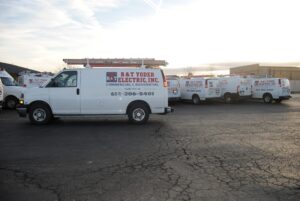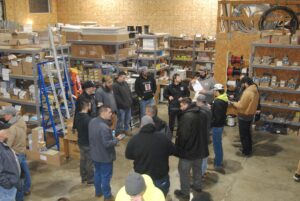Backup Generator Services
Get In Touch
Contact us For An Estimate
R&T Yoder Electric, Inc.
Yoder Electric's Professional Commercial Electrican Solutions
Our team is dedicated to delivering top-tier backup generator solutions, ensuring your family’s needs are met precisely when they’re needed. At Yoder Electric, we take immense pride in turning homes into safe havens through our exceptional backup generator services. Envision a place where safety, innovation, and efficiency seamlessly come together – that’s the commitment we extend to every household
Want An Estimate ?
Give us a call today or complete the form and we will reach out!
Looking for Expert Generator Installation?
Contact Us Today!
Why Choose
Yoder Electric
Yoder Electric is a trusted name in the electrical industry, serving both residential and commercial clients with excellence and reliability. With a legacy of over two decades, we’ve established ourselves as a go-to solution provider for all electrical needs.
At Yoder Electric, we understand the importance of staying ahead of technological advancements and industry standards. That’s why we continually invest in training and equipping our team with the latest tools and knowledge to provide cutting-edge solutions to our clients.
From residential homes to commercial establishments, we offer a wide range of services tailored to meet the unique needs of each client. Whether it’s ensuring uninterrupted power supply through generator installations, optimizing energy efficiency with electrical upgrades, or providing emergency services round the clock, we’re here to serve our customers with excellence.
Over 18 Locations Across Ohio!
For close to over two decades, we have been serving businesses throughout Central Ohio.
- Plain City
- Westerville
- Marysville
- Reynoldsburg
- Dublin
- Central Columbus
- Westlake
- Beachwood
- Dayton
- Springfield
- Pickerington
- Grove City
- Beavercreek
- Cincinnati
- London
- Delaware
- Hillard
- Gahanna
Who We Service
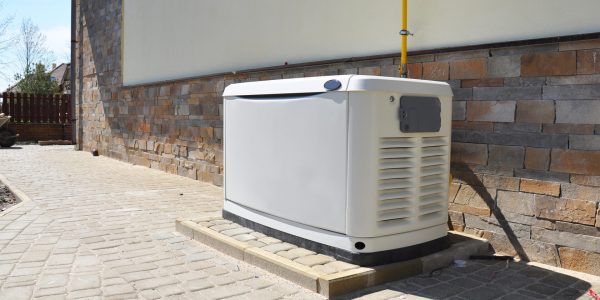
Residential Homes
For residential properties in Ohio, natural gas generators are often the preferred choice due to their reliability, convenience, and availability of fuel. Natural gas generators can seamlessly integrate with existing gas lines, providing a constant and uninterrupted power supply during outages. Additionally, natural gas generators produce fewer emissions compared to other fuel types, making them environmentally friendly options for Ohio homeowners.
Ohio residents are no strangers to severe weather conditions, including thunderstorms, snowstorms, and ice storms, which can lead to power outages lasting for hours or even days. Having a residential generator ensures that homeowners can maintain power for essential appliances, such as refrigerators, heating systems, and medical equipment, during emergencies. With a reliable backup power source in place, Ohio residents can safeguard their homes and families against the inconvenience and discomfort of prolonged outages.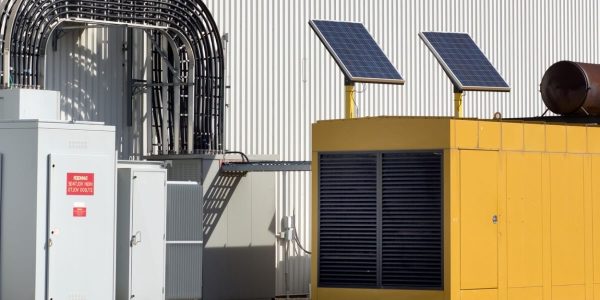
Commercial Businesses
Commercial businesses in Ohio can benefit from natural gas generators for their reliability, efficiency, and cost-effectiveness. Natural gas generators offer a continuous and steady power supply, making them suitable for powering critical systems and equipment in commercial settings. Additionally, natural gas generators require minimal maintenance and have lower operating costs compared to other fuel options, making them ideal for businesses seeking long-term energy solutions.
Ohio businesses face the risk of financial losses and operational disruptions during power outages, which can result from severe weather events, equipment failures, or grid failures. With a reliable backup power source in place, Ohio businesses can minimize downtime, mitigate risks, and maintain continuity during emergencies.Generator Services We Provide
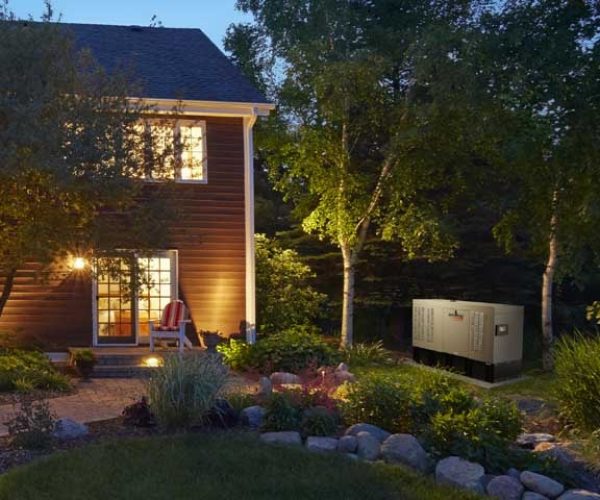
Generator Installation
Our expert technicians handle every aspect of the installation process, ensuring that your residential home generator is installed safely and efficiently. We begin by conducting a thorough assessment of your property to determine the best location for the generator and ensure compliance with local building codes and regulations. Our installation process includes proper anchoring, wiring, and connection to your home’s electrical system, guaranteeing reliable operation when you need it most.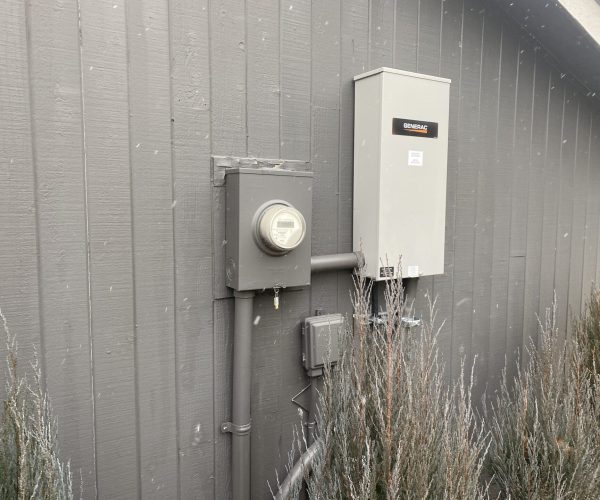
Load Calculation
Proper sizing of your generator is essential to ensure it can meet the power demands of your home during an outage. Our team performs comprehensive load calculations, taking into account factors such as the size of your home, electrical appliances, and heating/cooling systems. By accurately determining your power requirements, we can recommend the ideal generator size and capacity to keep your home powered during emergencies.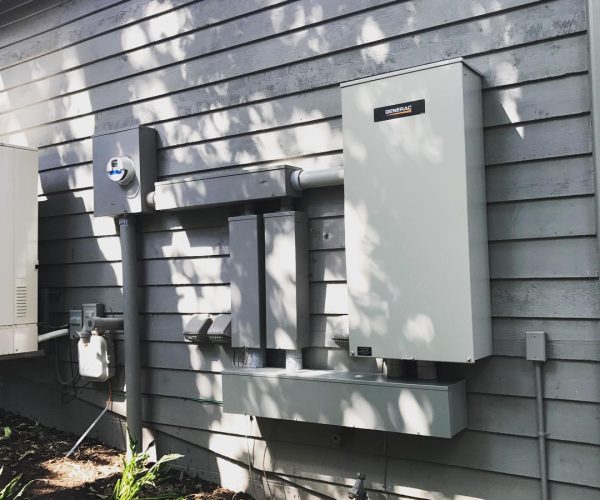
Wiring and Connections
Proper wiring and connections are critical for the safe and efficient operation of your residential home generator. Our experienced electricians ensure that all electrical components are installed according to manufacturer specifications and comply with industry standards. We use high-quality materials and techniques to establish reliable connections between the generator, transfer switch, and your home’s electrical system, minimizing the risk of electrical hazards and ensuring seamless operation.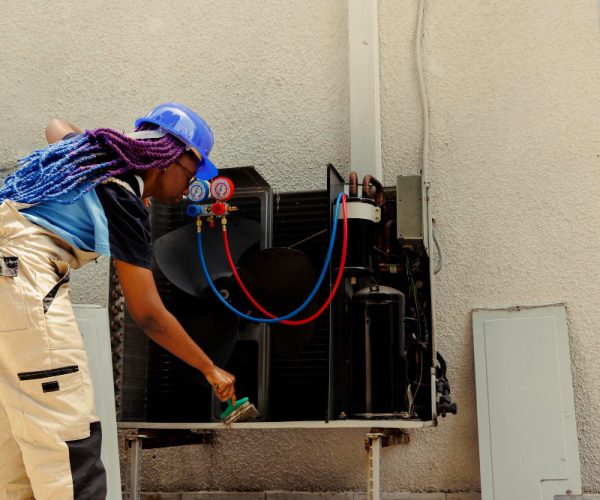
Routine Maintenance
Regular maintenance is essential to keep your residential home generator in optimal condition and ready to perform when needed. Our maintenance services include inspecting key components, checking fluid levels, testing battery performance, and verifying proper operation of automatic transfer switches. By scheduling routine maintenance visits, you can extend the lifespan of your generator, reduce the risk of unexpected failures, and ensure reliable backup power for your home.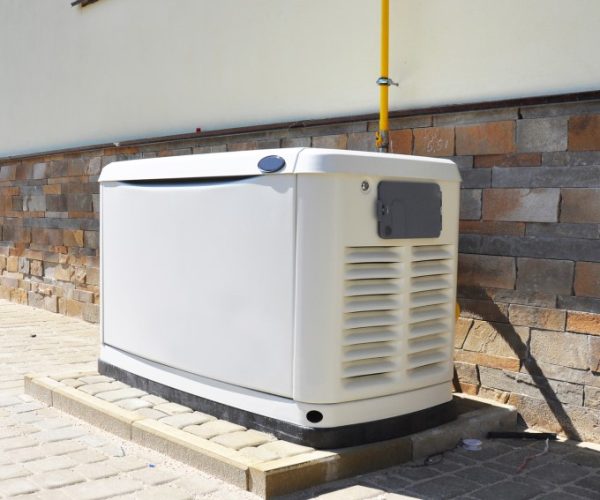
Repairs
In the event of a malfunction or breakdown, our experienced technicians are available to provide prompt and efficient repairs for your residential home generator. We begin by diagnosing the issue using advanced diagnostic tools and techniques, then develop a customized repair plan to address the problem effectively. Whether it’s a faulty component, electrical issue, or mechanical failure, we have the expertise to restore your generator to full functionality and minimize downtime for your home.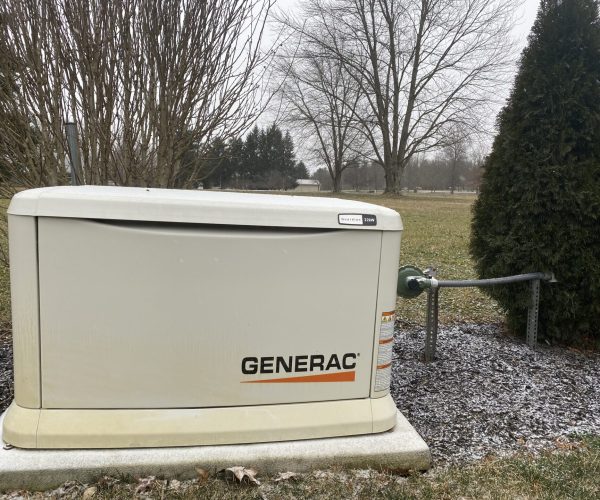
Upgrades and Retrofitting
If you’re looking to upgrade your existing generator or retrofit it with new features, our team can help. We offer custom solutions to meet your specific needs and requirements, whether it’s adding remote monitoring capabilities, integrating renewable energy sources, or improving fuel efficiency. Our technicians have the knowledge and expertise to assess your generator system and recommend the best upgrades to enhance performance, reliability, and convenience.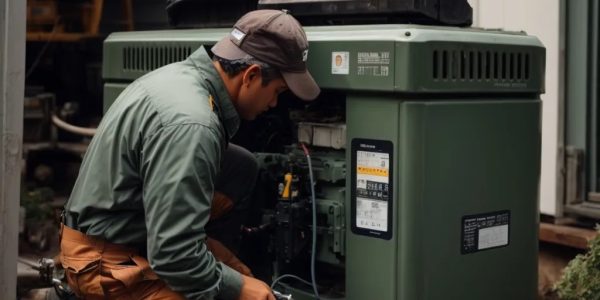
Emergency Services
Generator emergencies can occur at any time, which is why we offer 24/7 emergency services to address any issues promptly and effectively. Whether it’s a power outage, mechanical failure, or electrical problem, our team is ready to respond quickly to restore power to your home and ensure your safety and comfort. With our emergency services, you can have peace of mind knowing that help is just a phone call away whenever you need it most.
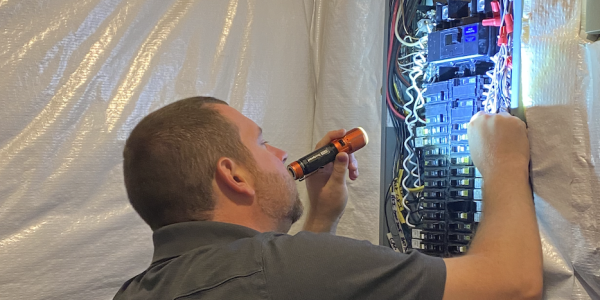
Compliance and Inspections
We ensure that your residential home generator complies with all relevant regulations and standards to ensure safe and reliable operation. Our thorough inspections include checking for proper installation, verifying electrical connections, testing automatic transfer switch functionality, and confirming compliance with local building codes. With our compliance and inspection services, you can rest assured that your generator meets the highest standards of safety and performance.
Types of Generators
For You to Choose From
When it comes to choosing the right generator for your needs, Yoder Electric offers a variety of options to suit every situation.
- Natural Gas Generators: Utilize natural gas as a fuel source, offering a clean and efficient power solution for residential and commercial properties.
- Solar Powered Generators: Harness solar energy to generate electricity, providing an environmentally friendly and sustainable power solution.
- Gasoline Powered Generators: Run on gasoline fuel, offering a portable and versatile power solution for temporary or backup power needs.
- Hydrogen Powered Generators: Utilize hydrogen gas as a fuel source, offering a clean and renewable power solution with zero emissions.
- Diesel Powered Generators: Run on diesel fuel, providing a reliable and efficient power solution for residential and commercial properties.
Financing is available for all of our customers considering installing a backup generator.
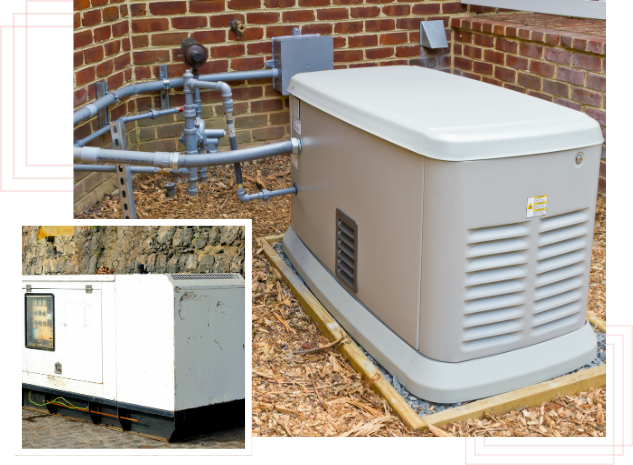
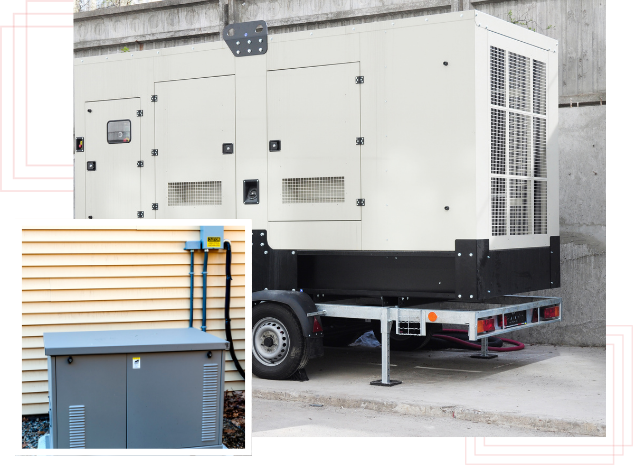
Reasons to install
Backup Generators
Installing a backup generator serves multiple critical purposes in safeguarding your home and family during power outages. One primary function is to ensure the continuous operation of essential appliances such as refrigerators, freezers, and medical devices like sleep apnea machines. By keeping these appliances powered, homeowners can prevent costly food spoilage and ensure the health and safety of individuals with medical conditions.
Additionally, a backup generator can power vital systems like furnaces during winter storms, preventing pipes from freezing and ensuring a warm and comfortable environment indoors. This is particularly crucial for homes in colder climates where prolonged power outages can pose significant risks. Moreover, homes susceptible to water-related issues, such as flooding, can benefit from powering a sump pump with a backup generator. This ensures that basements remain dry and protects against potential water damage to property.
Furthermore, backup generators provide peace of mind by maintaining connectivity to critical communication and security systems, such as remote monitoring devices for individuals with chronic health conditions or elderly family members. Additionally, having a backup power source can prevent disruptions to essential business operations for those who work remotely or operate home-based businesses.
Ultimately, the installation of a backup generator offers comprehensive protection and preparedness for unexpected power outages, ensuring that homeowners remain safe, comfortable, and connected during challenging circumstances.
Whole Home
Generators
When considering a generator for your property, one common decision homeowners face is whether to invest in a whole home generator or a backup generator. Each option offers distinct benefits and considerations, tailored to meet different needs and preferences.
Whole home generators, also known as standby generators, are permanently installed units that are connected directly to your home’s electrical system. These generators are designed to automatically activate within seconds of a power outage, providing seamless backup power to your entire home.
Benefits of Whole Home Generators:
- Automatic Operation: Whole home generators are designed to detect power outages and switch on automatically, ensuring uninterrupted power without any manual intervention.
- Comprehensive Coverage: These generators can power all essential appliances and systems in your home, including heating and cooling systems, lighting, refrigeration, and electronics.
- Increased Convenience: With whole home generators, there’s no need to manually refuel or start the generator during an outage, offering convenience and peace of mind.
- Enhanced Home Value: The permanent installation of a whole home generator can increase the resale value of your property, making it an attractive feature for potential buyers.
Considerations for Whole Home Generators:
- Higher Cost: Whole home generators typically require a larger upfront investment due to the cost of the generator unit, installation, and necessary electrical upgrades.
- Professional Installation: Installing a whole home generator requires professional expertise to ensure proper sizing, placement, and connection to your home’s electrical system.
- Maintenance Requirements: Regular maintenance is essential to keep a whole home generator in optimal condition and ensure reliable performance during power outages.
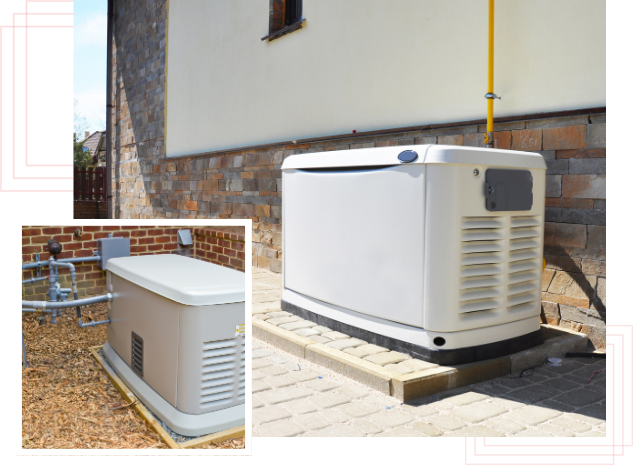
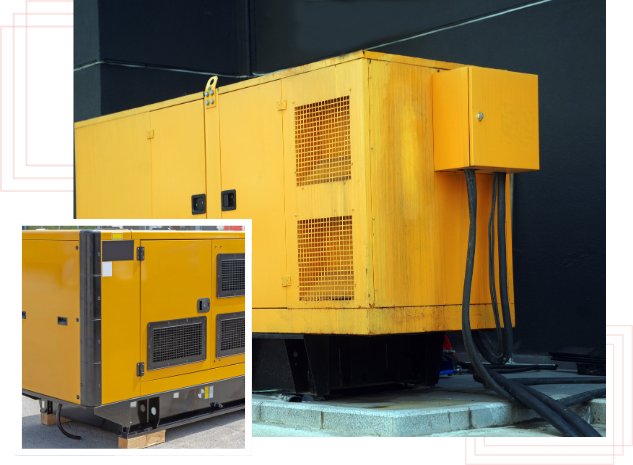
Backup
Generators
Backup generators, also known as portable generators, are standalone units that can be moved and connected to appliances or systems using extension cords or transfer switches during a power outage.
Benefits of Backup Generators:
- Lower Initial Cost: Backup generators are typically more affordable upfront compared to whole home generators, making them a cost-effective option for homeowners on a budget.
- Portability: Backup generators can be easily transported and used in various locations, making them suitable for camping trips, outdoor events, and emergency situations.
- Flexible Usage: Backup generators provide flexibility in powering specific appliances or areas of the home based on priority, allowing homeowners to customize their backup power solutions.
- DIY Installation: Setting up a backup generator is relatively straightforward, and homeowners with basic electrical knowledge can install and operate them safely.
Considerations for Backup Generators:
- Manual Operation: Unlike whole home generators, backup generators require manual startup and connection to appliances or systems during a power outage, which may not be ideal for all homeowners.
- Limited Coverage: Backup generators have limited capacity and may not be able to power all essential appliances simultaneously, requiring prioritization of power usage during outages.
- Fuel Dependency: Backup generators rely on fuel sources such as gasoline, propane, or diesel, which must be stored and refilled regularly to ensure continued operation during extended outages.
- Noise and Emissions: Backup generators can be noisy and produce exhaust emissions, requiring careful placement and ventilation to mitigate noise and air quality concerns.
Ultimately, the choice between a whole-home generator and a backup generator depends on factors such as budget, power needs, convenience, and long-term reliability. Consulting with a qualified electrician can help you determine the most suitable generator solution for your home and lifestyle.
Ongoing Servicing & Maintenance
For Generators
Another solution to save you time and money with your generator maintenance is to contact our service department. They can set up a residential service contract that would include ongoing maintenance of a backup generator or whole home generator. In addition, your residential service contract can include other household items as well, such as inspecting your control panel, hot tub or spa wiring, and any ongoing electrical troubleshooting you may encounter.
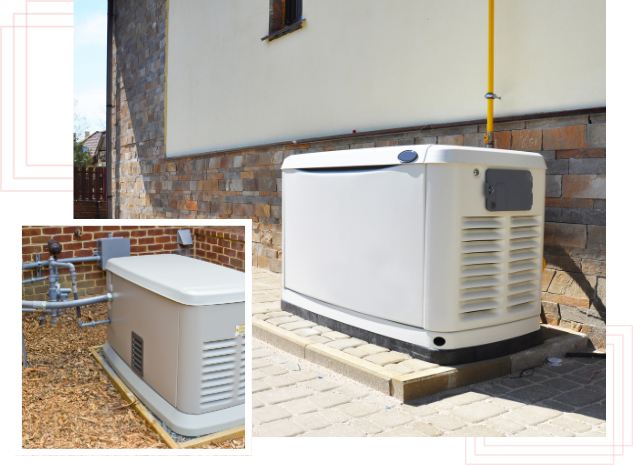
R&T YODER ELECTRIC, INC.
READY TO HELP YOU WITH YOUR GENERATOR NEEDS
Get licensed and bonded, professional commercial and industrial electrical work from R & T Yoder Electric. Call us to schedule an appointment or request an estimate today!
Generator FAQs
Since we first opened our doors, our technicians have encountered a wide range of inquiries, including where we’re located, how we operate, and an overview of our processes. To help facilitate this Q&A, we’ve put together this series of the most common questions and answers as a handy reference guide.
But of course, if you have any other questions beyond these about our commercial electrician services, feel free to reach out.
What is a backup generator?
First, what is a backup generator? At its most basic level, it’s a power source. A backup generator can be either permanent or portable. For the former, it would be considered a standby unit or a whole-house generator. For the latter, it’s what most people think of when they say they want a backup power source. In both cases, it serves to provide key appliances in your home with power in the event of an outage. A portable backup generator utilizes either diesel or gasoline, depending on the power demands of your specific unit. However, this also requires the homeowner to have an ample fuel supply on the property, such as a couple of gas cans in a detached storage shed. A typical setup for a backup generator is to power a refrigerator, a handful of lights, and maybe another appliance. It could also power your furnace during the colder winter months, using the power from the backup generator to keep your blower moving while still heating your home via natural gas. Another possible use case is for homes that are prone to flooding. A backup generator can keep your sump pump running. In fact, one particular homeowner wanted a backup generator specifically (and only) for their sump pump to protect their basement appliances.
What is a whole-house generator?
On the other hand, a whole-house generator is a more expansive solution to keep all of the important facets of your home running. We also call these permanent or standby generators. These types of units, once installed, stay in place all year long. This type of generator very much acts as an extension of your home’s power grid. A whole-house generator often will tie into your existing natural gas or propane lines. This is in contrast to a backup generator, which uses diesel or gasoline. This permanency is also another reason why a whole-house generator can power your entire household: the fuel source is continuous, with no immediate fears of running out. When a homeowner adds a whole house generator, they typically focus on the big items in their home. These include their refrigerator, freezer, forced air systems (including both heating and cooling units), water heater, and lighting. Depending on the size of your whole house generator, you could also consider supplying power to your outlets for items such as consumer electronics. Of special note is that some whole-house generator units also have a fuel tank. While many can be connected to your propane tank or natural gas line, this is a third (if less desirable) alternative to power your home while avoiding the headache of messing with your gas lines.
How do generators work?
Generators work by converting mechanical energy into electrical energy. They use an engine, typically powered by gasoline, diesel, natural gas, or propane, to rotate a magnet within a coil of wire. This motion creates an electric current, which is then routed through the generator's outlets to power appliances and devices.
What size generator do I need for my home?
The size of the generator you need depends on the power requirements of your home. A qualified electrician can perform a load calculation to determine the appropriate size based on factors such as the size of your home, the number of appliances, and your power needs during an outage.
How often should I perform maintenance on my generator?
Regular maintenance is essential to ensure your generator operates reliably during emergencies. It's recommended to perform maintenance at least once a year or according to the manufacturer's guidelines. This includes checking fluid levels, inspecting electrical connections, testing battery performance, and verifying overall functionality.
Can I install a generator myself?
Generator installation should be performed by a qualified electrician or technician familiar with local building codes and regulations. Attempting to install a generator yourself can lead to safety hazards, improper wiring, and potential damage to your home's electrical system.
How long can a generator run continuously?
The runtime of a generator depends on factors such as fuel capacity, load demand, and maintenance. Standby generators, which are connected to a continuous fuel source, can run for days or even weeks with proper maintenance. Portable generators typically have smaller fuel tanks and may need refueling every few hours.
Are generators noisy?
Generators produce noise while in operation, with noise levels varying depending on the type and size of the generator. Standby generators are generally quieter than portable generators, as they are housed in sound-insulated enclosures and operate at lower RPMs.
What is the difference between standby and portable generators?
Standby generators are permanently installed outside your home and automatically activate during a power outage, providing uninterrupted power to your electrical system. Portable generators are smaller, temporary units that must be manually started and connected to appliances using extension cords.
Can I connect my generator directly to my home's electrical system?
Connecting a generator directly to your home's electrical system requires a transfer switch, which safely isolates your home from the utility grid during an outage. This prevents backfeeding, protects utility workers, and ensures proper power distribution within your home.
Will a generator increase my home's value?
A properly installed and maintained generator can increase the value of your home, especially in areas prone to power outages or severe weather. Potential homebuyers may see a generator as a valuable asset that enhances safety, convenience, and peace of mind.
What is the lifespan of a generator?
The lifespan of a generator depends on factors such as usage, maintenance, and environmental conditions. With proper care and regular maintenance, standby generators can last 20 years or more, while portable generators typically have a shorter lifespan of 10-15 years. Regular maintenance and prompt repairs can help extend the lifespan of your generator.
Your Local Solution
A whole house generator or a backup generator, whichever you choose to go with, is an excellent way to prevent your home from losing power during the unexpected. After all, spoiled food can be costly to replace if your refrigerator or freezer is without power for too long. Critical medical equipment, especially for those with chronic conditions, needs to have unrestricted power access. And of course, if you have made the switch to an EV for your daily commute, you’ll need a way to charge it until the utility companies restore power to your home.
Would you like to learn more about how a qualified team can help you prepare for the unexpected with a whole-house generator or a backup generator? If so, then contact us HERE or call your local R&T Yoder Electric sales office. We’ve been providing services throughout Central Ohio. This includes all of our neighboring communities, such as Dublin, Delaware, Springfield, Pickerington, Grove City, Hilliard, Gahanna, even out as far as Cincinnati, Dayton and more. We look forward to serving your home and keeping it powered regardless of whatever the weather throws our way.




